(อ่านภาษาไทยด้านล่าง)

Happy New Year 2025!
As we say goodbye to 2024, we would like to extend our heartfelt gratitude to all who supported our work throughout the past year.
In December, we observed an important occasion, Human Rights Day (December 10), by joining others in urging the UN to protect riders and domestic workers and calling on Thailand to ratify ILO Conventions 87 and 98. We also wrapped up the year by engaging in discussions on labor and environmental resilience with Climate Resilience for All, a promising partner for the future work, and participating in APWLD’s FPAR training in the Philippines.
Our year-end story of impact sheds light on mental health issues in the workplace. Read as we explore why it deserves greater attention through the notable case of Dr. Keng.
To begin this new year, we at the Just Economy and Labor Institute wish you good health, unwavering spirit, and the resilience to overcome every challenge in 2025. As we exchange well wishes and gifts during this season, let us remember:
“Labor rights aren’t gifts; they are earned through solidarity and collective action.”
Our Work This Month
Strengthening Advocacy for Women Labour Rights in the Digital Age: Highlights from the 3rd Regional FPAR Training
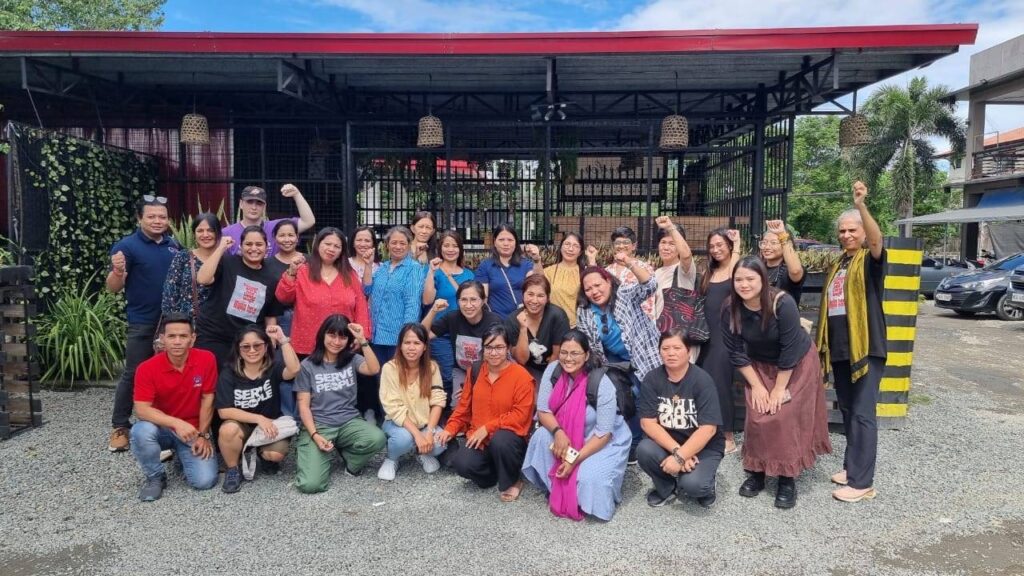
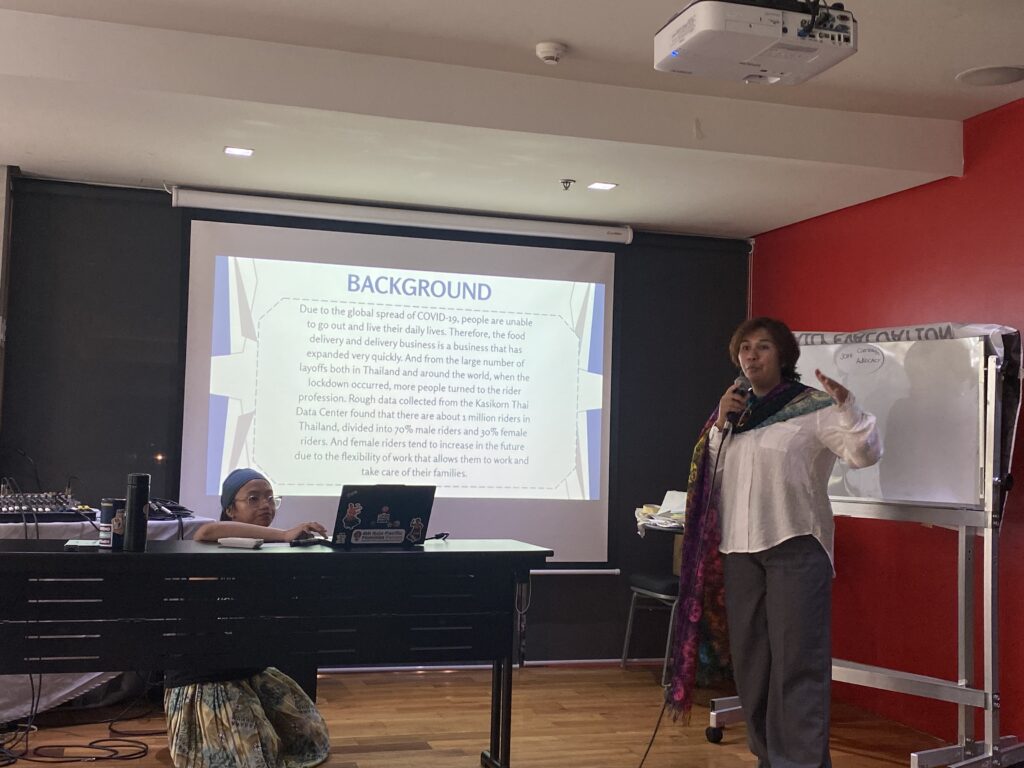
At the beginning of December, 1 to 5, JELI officers, together with Tannaree Jaruprasit, a woman rider leader and JELI’s FPAR researcher, visited Quezon City in the Philippines for the 3rd Regional Training on Labour Feminist Participatory Action Research (FPAR) focused on Women’s Labour Rights and Digitalisation.
The 5-day training aimed to identify gaps in the FPAR findings and analyses from Labour partners, with participants from India, Cambodia, the Philippines, Nepal, and Thailand. JELI’s research focused on women riders in the southern region of Thailand, highlighting the challenges they face in accessing social protection due to their unrecognized status as employees. This lack of recognition leaves them vulnerable, with limited access to essential benefits such as maternity leave and workplace injury compensation. It underscores the urgent need for policy reforms to ensure fair and equitable treatment for platform workers.
The training also provided knowledge and skills on advocacy and campaigning. Participants had the session to work on their advocacy plans, set to be implemented at local and national levels in 2025, while exploring potential regional and international collaboration. The training also served as preparation for the Regional Convening 2.0 on the impact of digitalisation on women workers and the upcoming International Labour Conference (ILC) 2025.
The highlight of the training was the learning exchange through a community visit to the Nexperia Workers’ Union in Cabuyao, Laguna. The union shared how the introduction of automation has led to the dismissal of many workers. Although technology is meant to assist humans, the factory implemented a system where one worker is responsible for operating eight machines. This significantly increased workloads, leaving workers uncertain about their job security. Despite these challenges, unionization empowered workers to negotiate CBAs with their employer. However, contractualization complicates organizing efforts. The differing statuses of full-time and contract employees create tension, making it difficult for them to unite as a single union.
JELI Observes Submission of Letter to UN in Commemoration of Human Rights Day
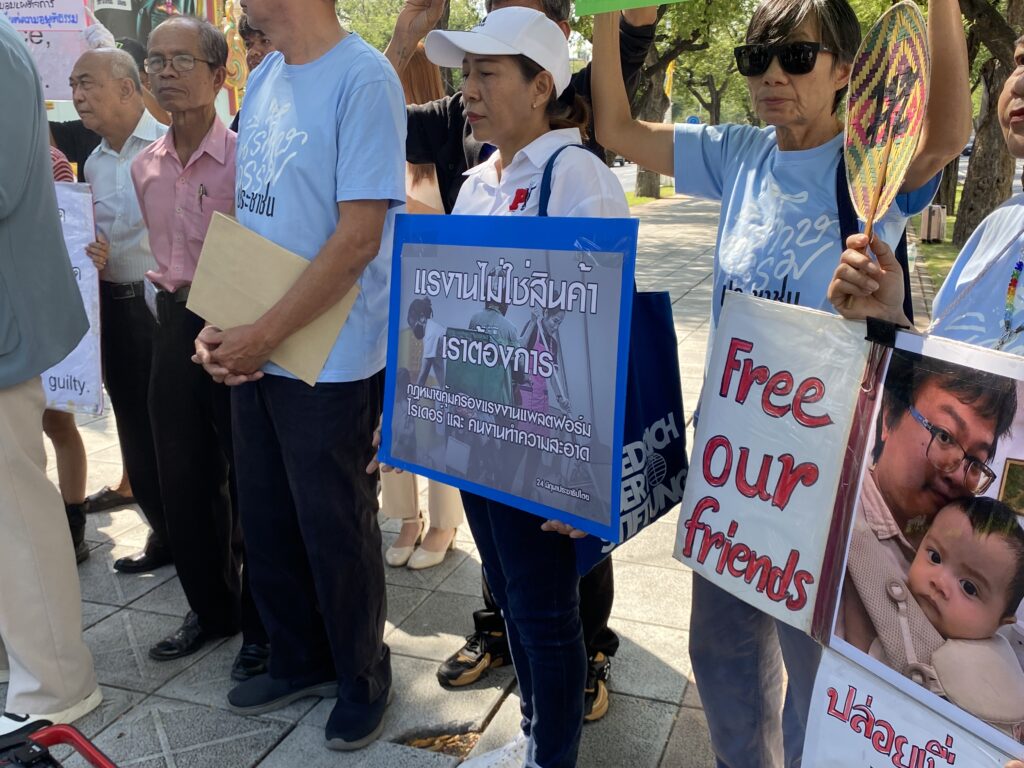
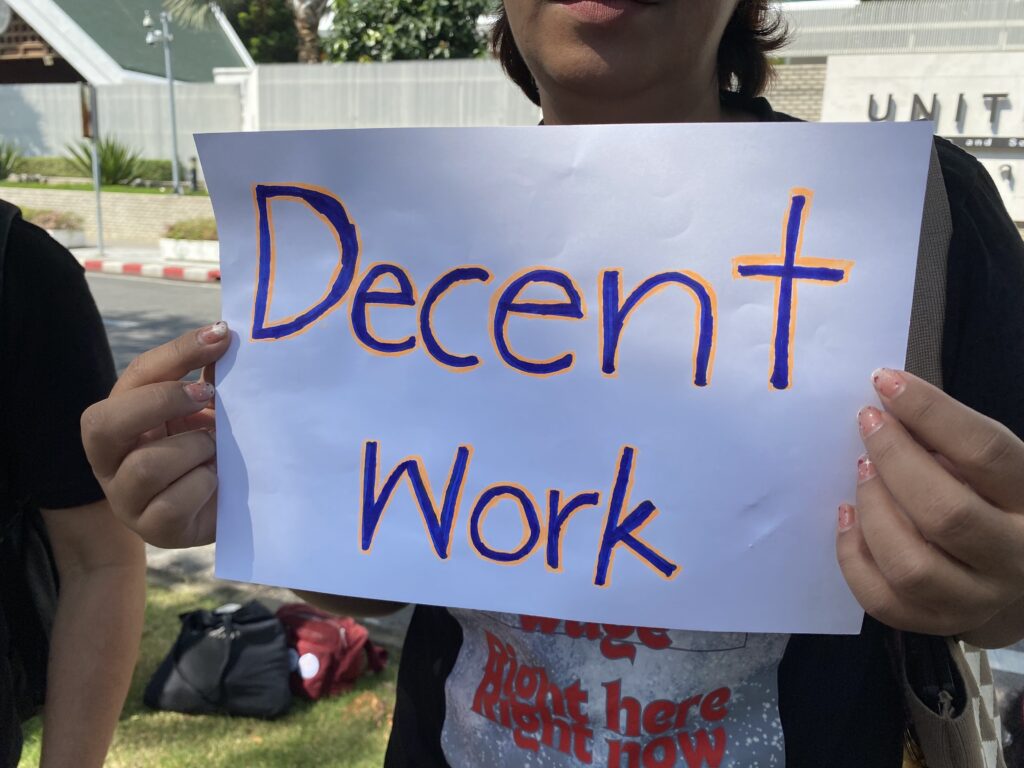
On December 10, 2024, Human Rights Day, representatives from various organizations, including the 24th June Democracy Group, the Workers’ Union, the Cross-Cultural Foundation, and Amnesty International Thailand, submitted a letter to the United Nations Human Rights Council, reporting on the human rights situation in Thailand.
A representative from the Workers’ Union addressed the issue of public sector employment being outsourced to contractor companies through bidding processes, which has led to various labor rights violations. In addition, around 400,000 platform workers, including domestic workers and riders, are working long hours in hazardous conditions without any legal protections. These workers are unable to form unions or engage in collective bargaining. The Thai government has yet to ratify ILO Conventions No. 87 on the freedom of association and protection of the right to organize and No. 98 on the right to organize and collective bargaining. The letter calls on the international community to pressure the Thai government to ratify these essential labor conventions.
Riders and Global Warming: Women Workers Discuss Global Warming and Its Impact on the Workforce
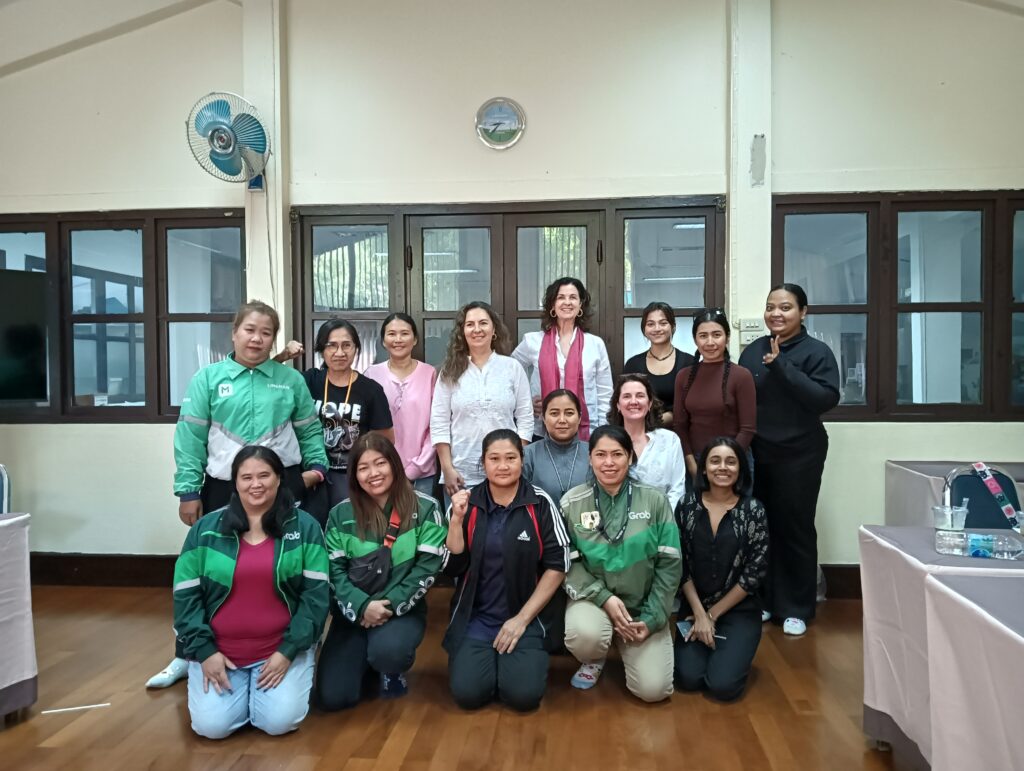

On December 17, JELI, platform women workers, and Climate Resilience for All, an organization dedicated to protecting the health, lives, and livelihoods of women and vulnerable communities from the impacts of extreme heat, met for a discussion in Bangkok.
Many female riders shared their experiences of suffering from migraines caused by intense heat, stress, and the rush to complete deliveries. Sleep deprivation is another common issue, as they often live in small rooms with inadequate ventilation. Even with air conditioning, the rising cost of electricity adds to their financial burden, especially for riders with children.
Prolonged hours on polluted roads expose them to health hazards, including PM 2.5 dust, leading to severe illnesses like lung cancer, which has prematurely claimed the lives of many workers. Under the colorful uniforms worn by riders, green, pink, orange, and others, lies multiple layers of clothing they wear to endure the scorching heat. Riders work in extreme temperatures while wearing helmets that press tightly on their heads, a necessity for safety on traffic-heavy roads.
Insufficient rest also directly impacts safety. Due to the nature of their work, riders are at constant risk of accidents. Some have reported pulling over at convenience stores to take a brief nap before resuming their jobs late into the night. Long hours of riding under the sun also cause vision problems, such as blurred eyesight and a higher risk of cataracts.
Currently, riders in Thailand do not receive income compensation for workdays lost due to illness, inadequate rest, or accidents and still lack access to essential social security benefits, which could help ease expenses like childcare or compensate for income loss when they fall sick. This is a key demand from rider groups across the country, urging the government to act on recommendations from the National Human Rights Commission. These recommendations include recognizing platform workers as employees under labor laws and holding companies accountable to international labor standards and the UN’s Business and Human Rights guidelines.
Important News
Employers oppose the September 24, 2024, resolution to extend migrant worker permits, citing complexity, high costs, and tight deadlines. Civil society groups fear many Myanmar workers may fall out of the system. Read more: Prachatai
People’s Party MPs propose 3 draft labor protection bills to address inequality, enhance workers’ rights, and expand the definition of “employer” and “employee” to include contract and freelance workers. Read more: The House of Representatives
Northern Labor Network marks International Migrants Day with proposals to government and authorities for concrete solutions to migrant workers’ issues, Calling for proactive legal protections and respect for human rights. Read more: Prachatai
Thousands of delivery drivers in Spain working for the food delivery app “Glovo” will soon be full employees after the company announced Monday that it was moving to an employment-based model. Read more: AP News
Story of Impact

Mental Health Matters: the Overlook Aspect of Occupational Hazard
Just over a year ago, a major news program in Thailand aired a story about “Dr. Keng” and her lawsuit with her employer, Mae Fah Luang University, which later gained traction on social media. During the program, Dr. Keng mentioned one of the crucial sources of support during her challenging times. She shared how, in her search for assistance from various organizations, JELI was one of the few to provide her with generous help.
Dr. Keng’s case highlights mental health issues, topics that have only recently started to gain broader acceptance and open discussion in Thailand. It also sheds light on unfair treatment stemming from mental health conditions. Dr. Keng recounted that her problems began with unjust treatment from her employer which severely impacted her life and mental health over more than 10 years.
In 2008, Dr. Keng, Prapakorn Winaisathaporn, received a scholarship from the Ministry of Higher Education, Science, Research and Innovation to pursue a PhD in England. During her studies, she began experiencing mental health issues, leading her to consult a university psychologist. Her condition worsened, and by 2012, she had to be hospitalized in a psychiatric hospital for 28 days.
Upon returning to the university, she received excellent care, including regular psychiatric consultations and significant support from faculty and staff. Importantly, she faced no stigma or discrimination due to her condition. The university’s care enabled Dr. Keng to resume and successfully complete her studies. However, when she returned to Thailand to work as a lecturer, things took a drastic turn. She received no mental health support from Mae Fah Luang University, her employer.
Dr. Keng continued to struggle with mental health issues and feelings of alienation from colleagues. In an environment where her organization showed no interest or provided proper care for her condition, the university used a single email she had sent, stating she was overwhelmed and considering resignation, to justify her termination.
Following her dismissal, Dr. Keng faced a lawsuit from the university demanding 16 million baht for breaching her scholarship contract. Left to fend for herself, she wandered alone for years, battling her mental health challenges while fighting the legal case with no substantial support. Later on a law professor advised her and helped draft an appeal to contest the court’s decision, during which her mental health struggles persisted, and she was unable to find employment.
Lacking the strength to seek work on her own, she found solace when representatives from the Mirror Foundation, provided emotional encouragement. Their support helped her regain hope and start applying for jobs.
Dr. Keng began a new job after a successful interview. Her new workplace offered understanding and empathetic colleagues who supported her recovery. Despite becoming a public figure due to social media coverage of her story, which caused her significant anxiety, she received encouragement from compassionate individuals who helped restore her confidence.
On Friday, November 1, 2024, the Chiang Mai Administrative Court delivered its verdict from the Supreme Administrative Court, ruling in favor of Dr. Keng by dismissing the case against her. The court determined that Dr. Keng had not breached her scholarship contract.
The email she had written to the dean, which the university claimed constituted her resignation, was not a resignation letter. Instead, Mae Fah Luang University had failed to adhere to the regulations of the Ministry of Finance and the terms of the scholarship contract. The university did not consult the Ministry of Higher Education, Science, Research and Innovation, the Office of the Civil Service Commission, or the Ministry of Finance, as required, to determine whether Dr. Keng’s mental health condition disqualified her from civil service eligibility.
The court concluded that Dr. Keng had not violated her contract and therefore was not liable to repay the scholarship funds or any associated penalties.
The case of Dr. Keng points out the inadequacies of systems in Thailand that fail to provide sufficient mental health support within the workplace. The management discriminated against employees and neglected to offer mental health care, potentially violating labor rights and the legal protections in place for employees’ mental well-being. The case also points to the added challenges women face in the workplace, where mental health issues are often worsened by gender stereotypes.
Employees often face violations by employers, but action is typically only taken when physical harm is evident. Mental health, however, is often overlooked or treated as a taboo topic, despite the significant impact it has on many workers suffering from stress, anxiety, and depression. In some countries, workplace mental health policies are mandated by law. In the UK, employers are legally required to accommodate and safeguard the mental health of employees. In contrast, Thailand still has a long way to go to ensure that mental health receives the attention it deserves in the workplace.
In Thailand, labor laws primarily focus on protecting health and safety in the workplace, particularly in terms of preventing accidents and mitigating risks associated with occupational hazards. However, when it comes to mental health protection specifically, labor laws still lack clear and concrete provisions.
The most crucial step is for governments to take stronger action to protect workers’ mental health through legal frameworks, establish clearer guidelines for mental health support and encourage workplace benefits to ensure that workers are not discriminated against because of their mental health conditions.
Special thanks to Dr. Keng for her courage and openness in sharing her story to shed light on the challenges and triumphs of navigating mental health.
สวัสดีปีใหม่ 2568!
ขอขอบคุณทุกท่านที่ให้การสนับสนุนงานของเราเสมอมาตลอดปี 2567
เดือนธันวาคมที่ผ่านมามีโอกาสสำคัญอย่างยิ่งคือวันสิทธิมนุษยชนสากล ซึ่ง JELI ได้ไปร่วมยื่นหนังสือต่อคณะมนตรีสิทธิมนุษยชนแห่งสหประชาชาติเพื่อรายงานสถานการณ์สิทธิมนุษยชนในไทย และผลักดันการคุ้มครองแรงงานแพลตฟอร์มและเรียกร้องให้รัฐบาลไทยลงสัตยาบันในอนุสัญญา ILO ฉบับที่ 87 และ 98 นอกจากนี้ เรายังส่งท้ายปีด้วยการหารืออย่างสร้างสรรค์ร่วมกับองค์กร Climate Resilience for All ในประเด็นการทำงานของไรเดอร์กับผลกระทบจากสภาพอากาศ และได้เข้าร่วมการอบรมเพื่อส่งเสริมสิทธิแรงงานหญิงในยุคดิจิทัลที่ประเทศฟิลิปปินส์
เรื่องเล่ารายเดือนส่งท้ายปีนี้เป็นประเด็นของปัญหาสุขภาพจิต ซึ่งเราอยากให้ทุกคนได้ร่วมกันตระหนักถึงความจำเป็นในการยกระดับความสำคัญของปัญหาสุขภาพจิตในที่ทำงานผ่านกรณีศึกษาของ ดร.เค็ง
สำหรับการเริ่มต้นปีใหม่นี้ JELI ขออวยพรให้ทุกท่านมีความสุข สุขภาพแข็งแรง มีพลังใจ และพร้อมจะก้าวข้ามทุกอุปสรรคในปี 2025 ที่เราจะเดินไปด้วยกันเพื่ออนาคตที่ดีกว่าสำหรับแรงงานทุกคน ปีใหม่เป็นช่วงเวลาแห่งของขวัญและการให้ แต่ขอให้เราจดจำไว้ว่า
“สิทธิแรงงานไม่ใช่ของขวัญ แต่เป็นสิ่งที่เราต้องเรียกร้องและส่งเสริมร่วมกัน”
งานของเรา
การฝึกอบรม FPAR ระดับภูมิภาค ครั้งที่ 3: การเสริมสร้างการรณรงค์เพื่อสิทธิแรงงานหญิงในยุคดิจิทัล
เมื่อต้นเดือนธันวาคม ระหว่างวันที่ 1 ถึง 5 ธันวาคม เจ้าหน้าที่ JELI และธัญญ์นรี จารุประสิทธิ์ นักวิจัย FPAR ได้เข้าร่วมการฝึกอบรมระดับภูมิภาค ครั้งที่ 3 เกี่ยวกับการวิจัยการกระทำร่วมของสตรีในแรงงาน (FPAR) ซึ่งมุ่งเน้นไปที่สิทธิแรงงานของสตรีและการดิจิทัล ที่เมือง Quezon City ประเทศฟิลิปปินส์
การฝึกอบรมระยะเวลา 5 วัน เป็นการมุ่งเน้นการวิเคราะห์หาช่องว่างของผลการวิจัยขององค์กรแรงงานที่เข้าร่วมจากประเทศอินเดีย กัมพูชา ฟิลิปปินส์ เนปาล และไทย งานวิจัยของ JELI มุ่งเน้นไปที่ไรเดอร์หญิงในจังหวัดทางภาคใต้ของไทย โดยเน้นถึงปัญหาในการเข้าถึงความคุ้มครองทางสังคม เนื่องจากสถานะที่ยังไม่ถูกยอมรับเป็นลูกจ้าง ทำให้ไรเดอร์หญิงเกิดความเสี่ยงและไม่สามารถเข้าถึงสิทธิประโยชน์ที่สำคัญเช่น การลาคลอดและการชดเชยจากอุบัติเหตุจากการทำงาน การวิจัยนี้ชี้ให้เห็นถึงความจำเป็นเร่งด่วนในการปรับแก้นโยบายเพื่อให้เกิดความคุ้มครองที่เป็นธรรมสำหรับคนงานแพลตฟอร์ม
การฝึกอบรมครั้งนี้ยังได้เสริมสร้างความรู้และทักษะในการรณรงค์และการทำแคมเปญ โดยผู้เข้าร่วมได้ทำงานร่วมกันในการวางแผนการรณรงค์เพื่อสิทธิแรงงานหญิง ซึ่งคาดว่าจะนำไปปรับใช้ในระดับท้องถิ่นและระดับประเทศในปี 2025 และโอกาสในการพัฒนาต่อในระดับภูมิภาคและระหว่างประเทศ นอกจากนี้ ยังได้เตรียมความพร้อมสำหรับการประชุมระดับภูมิภาค 2.0 ที่จะพูดถึงผลกระทบจากยุคดิจิทัลต่อแรงงานหญิงและการประชุมใหญ่ขององค์การแรงงานระหว่างประเทศ (ILC) 2025
หนึ่งในไฮไลต์ของการฝึกอบรมคือการแลกเปลี่ยนเรียนรู้ผ่านการเยี่ยมชุมชนสหภาพแรงงาน Nexperia ในเมือง Cabuyao, Laguna การเยี่ยมชมครั้งนี้ทำให้ได้ข้อมูลเชิงลึกเกี่ยวกับผลกระทบจากระบบ Automation ในโรงงาน ซึ่งสหภาพฯ แชร์ว่ามีแรงงานถูกบังคับออกจากจำนวนมาก การนำเครื่องจักรเทคโนโลยีเข้ามาช่วยในการผลิตกลับกลายเป็นการเพิ่มภาระงานให้กับแรงงาน เพราะโรงงานใช้ระบบแรงงาน 1 คน ดูแลเครื่องจักรถึง 8 เครื่อง นอกจากจะไม่ได้แบ่งเบาภาระงานกลับทำให้เกิดความไม่มั่นคงในอาชีพด้วย อย่างไรก็ตาม ปัญหาเหล่านี้ทำให้สหภาพฯ ได้รวมพลังกันในการเจรจาต่อรองกับนายจ้างในหลายข้อเรียกร้อง นอกจากนี้ การปรับสถานภาพของลูกจ้างประจำเป็นลูกตามชั่วคราวตามสัญญาก็ส่งผลกระทบต่อการรวมกลุ่ม เนื่องจากเงื่อนไขการจ้างงานที่แตกต่างกันทำให้สภาพปัญหาและเป้าหมายแตกต่างกัน เป็นอุปสรรคในรวมกลุ่มเป็นสหภาพเดียวกัน
10 ธันวาคม “วันสิทธิมนุษยชนสากล (Human Rights Day)” JELI ร่วมยื่นหนังสือต่อคณะมนตรีสิทธิมนุษยชนแห่งสหประชาชาติ
องค์การสหประชาชาติได้กำหนดให้วันที่ 10 ธันวาคมของทุกปี เป็น “วันสิทธิมนุษยชนสากล (Human Rights Day)” ในวันสิทธิมมนุษยชน 2567 นี้ JELI ได้ร่วมสังเกตการณ์การยื่นหนังสือต่อคณะมนตรีสิทธิมนุษยชนแห่งสหประชาชาติ ซึ่งดำเนินการโดยกลุ่ม 24 มิถุนาประชาธิปไตย สหภาพคนทำงาน มูลนิธิผสานวัฒนธรรมและแอมเนสตี้ อินเตอร์เนชั่นแนล ประเทศไทย เพื่อรายงานสถานการณ์สิทธิมนุษยชนประเทศไทยและเรียกร้องให้องค์การสหประชาติให้ความสำคัญกับประเด็นการปล่อยตัวนักโทษทางการเมืองและการจ้างงานที่ไม่เป็นธรรม
ผู้แทนจากสหภาพคนทำงานได้รายงานถึงสถานการณ์การจ้างงานภาครัฐ ซึ่งจากเดิมเป็นการจ้างงานสัญญาจ้างปีต่อปี ปัจจุบันจะเปลี่ยนเป็นการจ้างงานด้วยการประมูลจากบริษัทรับเหมาช่วง ที่จะส่งผลให้มีการละเมิดสิทธิแรงงานในด้านต่างๆ นอกจากนี้ยังมีการจ้างงานแพลตฟอร์ม เช่น ไรเดอร์กว่า 400,000 คน ที่ทำงานยาวนานหลายชั่วโมงบนท้องถนน เสี่ยงอันตราย แต่ไม่มีกฎหมายคุ้มครองแรงงาน และไม่สามารถรวมตัวเป็นสหภาพแรงงานและการเจราต่อรองได้ เนื่องจากรัฐบาลไทยยังไม่ให้การรับรองอนุสัญญาแรงงานระหว่างประเทศ (ILO) ฉบับที่ 87 ว่าด้วยเสรีภาพการรวมตัวเป็นสหภาพแรงงาน และฉบับที่ 98 ว่าด้วยการเจรจาต่อรองร่วม จึงได้มายื่นหนังสือและเรียกร้องต่อนานาชาติให้กดดันรัฐบาลไทยรับรองอนุสัญญาแรงงาน 2 ฉบับนี้
JELI กลุ่มแรงงานแพลตฟอร์มหญิง และ Climate Resilience for All ร่วมหารือประเด็นปัญหาสภาพอากาศกับการทำงาน
เมื่อวันที่ 17 ธันวาคม JELI ได้พบกับกลุ่มแรงงานแพลตฟอร์มหญิงและ Climate Resilience for All องค์กรด้านการดูแลสุขภาพและชีวิตของผู้หญิงและกลุ่มเปราะบางในสังคมภายใต้ภาวะโลกร้อนเพื่อพูดคุยเกี่ยวกับประเด็นการปัญหาสภาพอากาศกับการทำงาน
ไรเดอร์หญิงหลายคนได้บอกเล่าถึงอาการปวดศีรษะไมเกรน เมื่อต้องทำงานภายใต้อากาศร้อนจัดและความเคร่งเครียดเร่งรีบในการทำงาน หลายคนมักมีปัญหาการนอนหลับ พักผ่อนไม่เพียงพอ เพราะอาศัยในบ้านพักที่เป็นห้องขนาดเล็กในอาคาร ถึงแม้จะมีเครื่องปรับอากาศช่วยลดความร้อน แต่ค่ากระแสไฟฟ้าที่แพงขึ้นเรื่อยๆ แต่ละเดือนได้เพิ่มภาระค่าใช้จ่ายในการดำเนินชีวิตของไรเดอรซึ่งส่วนใหญ่มีลูกเล็กในวัยเรียน ภายใต้ชุดฟอร์มยี่ห้อต่างๆ ที่ต้องสวมใส่ในการทำงาน ทั้งสีเขียว สีชมพู สีส้ม ก็ยังมีเสื้อผ้าชั้นในอีกหลายชั้น พวกเธอทำงานภายใต้ความร้อนและอุณหภูมิที่สูงจัด ทั้งยังมีหมวกกันน็อกที่บีบศีรษะตลอดเวลา แต่จำเป็นต้องใส่เพื่อการทำงานบนท้องถนนที่เสี่ยงต่ออุบัติเหตุ ในขณะที่คนงานหญิงแพลตฟอร์มเหล่านี้ยังเข้าไม่ถึงสวัสดิการประกันสังคมที่จะช่วยแบ่งเบาภาระค่าใช้จ่ายจำเป็นต่างๆ อาทิ ค่าเลี้ยงดูบุตรและชดเชยการสูญเสียรายได้ในวันที่เจ็บป่วยหลังจากการทำงานอย่างยาวนานบนท้องถนนที่เต็มไปด้วยมลพิษและฝุ่น PM 2.5 ที่คร่าชีวิตของคนทำงานในประเทศไทยคนแล้วคนเล่าด้วยโรคมะเร็งปอด
การพักผ่อนไม่เพียงพอส่งผลกระทบโดยตรงต่อคนทำงานไรเดอร์ ด้วยลักษณะงานที่เสี่ยงต่ออุบัติเหตุตลอดเวลา ต้องทำงานบนท้องถนนที่มีการจราจรคับคั่ง หลายคนเมื่อขับขี่ต่อไปไม่ไหวเพราะอาการหลับใน จำเป็นต้องหยุดรับออเดอร์วิ่งงานเพื่อไปหาสถานที่หน้าร้านสะดวกซื้อที่พอจะจอดรถได้แล้วนั่งงีบหลับเอาแรงก่อนจะกลับสู่ถนนเพื่อทำงานต่อไปจนถึงยามค่ำคืน การขับขี่รถมอเตอรไซด์ภายใต้แสงแดดจัดเป็นเวลานานยังสร้างปัญหาการมองเห็น หลายคนมีปัญหาดวงตาพร่ามัวและมีภาวะเป็นต้อ
ทุกชั่วโมงหรือวันที่ต้องหยุดทำงานเพราะเหตุผลจากการเจ็บป่วย พักผ่อนไม่เพียงพอ หรือเมื่อเกิดอุบัติเหตุจากการทำงานส่งอาหาร ส่งพัสดุ ส่งคน ไรเดอร์ในประเทศไทยยังไม่ได้รับเงินทดแทนเมื่อสูญเสียรายได้จากการหยุดงาน ซึ่งเป็นข้อเรียกร้องหลักของกลุ่มไรเดอร์ทั่วประเทศให้รัฐบาลเร่งปฏิบัติตามข้อเสนอแนะของคณะกรรมการสิทธิมนุษยชนแห่งชาติที่ได้ทำการสอบสวนสภาพและลักษณะการทำงานของไรเดอร์แพลตฟอร์มว่าทำงานในลักษณะลูกจ้างของบริษัท และให้รัฐบาลบังคับใช้กฏหมายแรงงานต่อบริษัทแพลตฟอร์มเพื่อให้สอดคล้องกับหลักมาตรฐานแรงงานสากลขององค์การแรงงานระหว่างประเทศและแนวปฏิบัติว่าด้วยธุรกิจกับสิทธิมนุษยชนขององค์การสหประชาชาติที่ประเทศไทยเป็นสมาชิก
ในการพบปะแลกเปลี่ยนประสบการณ์เรื่องการทำงานของไรเดอร์ภายใต้อุณหภูมิโลกที่สูงขึ้นนี้ ยังได้หารือกันถึงทางออกต่างๆ เพื่อการทำงานและการดำรงชีวิตที่ปลอดภัยและมีสุขภาพดี อาทิ เครื่องแต่งกายที่ลดความร้อน สถานีน้ำดื่มและพักผ่อนในช่วงที่มีแสงแดดจัด รวมถึงการรวบรวมข้อเรียกร้องของไรเดอร์แพลตฟอร์มและคนทำงานภาคส่วนต่างๆ เพื่อการเจรจากับบริษัทแพลตฟอร์มและรัฐบาลเพื่อการกำหนดนโยบายการคุ้มครองคนทำงานทุกภาคส่วนที่ต้องเผชิญกับสภาวะโลกร้อน
ข่าวสำคัญ
ตัวแทนนายจ้าง SME เข้าหารือกระทรวงแรงงาน ค้านมติ ครม. 24 กันยายน 67 ต่ออายุแรงงานพม่ายุ่งยาก ซับซ้อนเป็นภาระค่าใช้จ่ายหนัก และเปิดช่องให้ “คิวผี” พร้อมเสนอตัดขั้นตอนจากประเทศต้นทาง ภาคประชาสังคมกังวลแรงงานพม่าหลุดออกจากระบบ อ่านต่อที่: ประชาไท
สส.พรรคประชาชน ยื่นร่าง พ.ร.บ. คุ้มครองแรงงาน 3 ฉบับ ต่อเลขาธิการสภาผู้แทนราษฎร โดยมีสาระความสำคัญคือ หลักการกำหนดมาตรฐานการจ้างที่เป็นธรรมและการสนับสนุนสวัสดิการคุ้มครองคนทำงานที่ไม่ทิ้งใครไว้ข้างหลัง ซึ่งรวมไปถึงการเพิ่มคำนิยาม “นายจ้างและลูกจ้าง” การเพิ่มค่าแรงขั้นต่ำ และวันหยุดต่างๆ อ่านต่อที่: สภาผู้แทนราษฎร
เครือข่ายแรงงานภาคเหนือยื่นข้อเสนอต่อรัฐบาลและหน่วยงานที่มีอำนาจเกี่ยวข้องเนื่องในโอกาสวันผู้อพยพย้ายถิ่นสากล เรียกร้องการคุ้มครองแรงงานข้ามชาติอย่างเป็นรูปธรรมและหลักปฏิบัติที่เคารพต่อสิทธิมนุษยชน อ่านต่อที่: ประชาไท
บริษัทแพลตฟอร์มแอปพลิเคชันเดลิเวอรี่ “Glovo” ของสเปน ประกาศดำเนินการให้สถานะลูกจ้างกับไรเดอร์ของแอปฯ ตามรูปแบบการจ้างงานแบบนายจ้าง-ลูกจ้าง แทนการจ้างงานแบบฟรีแลนซ์ โดยเป็นผลสืบเนื่องจากการกดดันของรัฐบาลสเปนอย่างต่อเนื่องเป็นเวลาหลายปี อ่านต่อที่: AP News
เรื่องเล่ารายเดือน
ปัญหาสุขภาพจิตในที่ทำงาน: อันตรายที่ถูกมองข้าม
เมื่อเดือนธันวาคมปี 2023 รายการข่าวชื่อดังหลายรายการในประเทศไทยได้ออกอากาศการสัมภาษณ์ “ดร.เค็ง” เกี่ยวกับคดีความของเธอกับมหาวิทยาลัยแม่ฟ้าหลวง ซึ่งเมื่อเผยแพร่ออกไปก็ได้รับความสนใจอย่างมากในโลกออนไลน์ ในการสัมภาษณ์ครั้งนั้น ดร.เค็ง ได้กล่าวถึงแหล่งช่วยเหลือสนับสนุนของเธอในช่วงระยะเวลาที่ต้องเผชิญหน้ากับปัญหานานัปการ หนึ่งในนั้นก็คือสถาบันแรงงานและเศรษฐกิจที่เป็นธรรม
คดีความของ ดร.เค็ง นั้นถือเป็นเรื่องราวโดยตรงเกี่ยวกับปัญหาสุขภาพจิต ซึ่งในประเทศไทยอาจกล่าวได้ว่าเพิ่งจะเป็นที่ยอมรับและสามารถพูดคุยกันอย่างแพร่หลายเปิดเผยในระยะเวลาไม่นาน ทั้งยังเป็นกรณีตัวอย่างของการถูกปฏิบัติอย่างไม่เป็นธรรมในสถานที่ทำงานซึ่งเป็นผลมาจากการเจ็บป่วยทางจิต ดร.เค็ง เล่าว่าปัญหาของเธอนั้นเริ่มต้นมาจากการปฏิบัติอย่างไม่เป็นธรรมโดยนายจ้าง ซึ่งส่งผลกระทบอย่างหนักต่อสุขภาพจิตและวิถีชีวิตของเธอมาเป็นระยะเวลากว่า 10 ปี
ในปี 2008 ดร.เค็ง-ประภากร วินัยสถาพร ได้รับทุนการศึกษาต่อในระดับปริญญาเอกที่ประเทศอังกฤษจากกระทรวงการอุดมศึกษา วิทยาศาสตร์ วิจัยและนวัตกรรม ในระหว่างที่เธอศึกษาอยู่นั้น ได้เริ่มมีอาการของปัญหาสุขภาพจิตจนต้องเข้าพบกับนักจิตวิทยาของมหาวิทยาลัย อาการของเธอแย่ลงเรื่อยๆ จนกระทั่งต้องเข้ารับการรักษาในโรงพยาบาลจิตเวชเป็นเวลากว่า 28 วัน ในปี 2012
เมื่อกลับมาที่มหาวิทยาลัย เธอได้รับการดูแลเป็นอย่างดีจากทั้งคณะและเจ้าหน้าที่ ได้เข้าพบกับจิตแพทย์อย่างสม่ำเสมอ และที่สำคัญคือเธอไม่ถูกเลือกปฏิบัตหรือทำให้รู้สึกแปลกแยกจากอาการป่วยของเธอแต่อย่างใดการดูแลเป็นอย่างดีจากมหาวิทยาลัยทำให้ ดร.เค็ง สามารถศึกษาต่อได้จนสำเร็จ แต่เมื่อถึงเวลาที่ต้องกลับประเทศไทยเพื่อทำงานเป็นอาจารย์ที่มหาวิทยาลัยแม่ฟ้าหลวงตามเงื่อนไขของทุนการศึกษา ทุกสิ่งทุกอย่างกลับพลิกผัน เธอไม่ได้รับการดูแลปัญหาสุขภาพจิตแต่อย่างใดจากที่ทำงาน
ดร.เค็ง ทำงานโดยต้องต่อสู้กับอาการป่วยทางจิตที่ส่งผลต่อการกระทำและสภาวะการตัดสินใจ ทั้งยังถูกทำให้รู้สึกแปลกแยกจากเพื่อนร่วมงาน ท่ามกลางสภาพแวดล้อมที่ทำงานที่ไม่ได้ให้ความสนใจหรือช่วยเหลืออย่างเหมาะสมกับอาการป่วยนั้น เธอส่งอีเมล์ถึงอธิการบดีแจ้งว่าเธอไม่ไหวและอยากจะลาออก โดยขอให้ทางมหาวิทยาลัยช่วยตรวจสอบกับสำนักงานคณะกรรมการข้าราชการพลเรือน แต่สิ่งที่ต้องพบเจอคือ มหาวิทยาลัยใช้อีเมล์ฉบับนั้นเป็นเหตุผลในการให้เธอออกจากงาน
หลังจากนั้น มหาวิทยาลัยแม่ฟ้าหลวงยื่นฟ้อง ดร.เค็ง เป็นเงินมูลค่ากว่า 16 ล้านบาท ด้วยข้อกล่าวหาที่ว่าการลาออกของ ดร.เค็ง เป็นการผิดสัญญาของทุนการศึกษา ดร.เค็ง ที่ยังอยู่ในอาการป่วย ทั้งยังต้องออกจากงานต้องต่อสู้กับคดีความเพียงลำพังเป็นเวลาหลายปีโดยที่ไม่ได้รับความช่วยเหลือใดๆ ทั้งปัญหาสุขภาพจิตก็เป็นอุปสรรคต่อการหางานทำในขณะนั้น ต่อมาภายหลัง จึงได้มีอาจารย์กฎหมายเข้ามาให้คำแนะนำในการเขียนรายงานโต้แย้งต่อศาลและเอกสารอื่นๆ
ระหว่างนั้นก็เป็นช่วงที่ ดร.เค็ง ได้พบกับตัวแทนจากมูลนิธิกระจกเงาที่เข้ามาช่วยเหลือและให้กำลังใจการสนับสนุนนี้มีความสำคัญอย่างมากในการทำให้เธอกลับมามีความหวังและเริ่มต้นหางานใหม่อีกครั้ง ดร.เค็ง เริ่มต้นงานใหม่หลังจากผ่านการสอบสัมภาษณ์งานกับองค์กรหนึ่ง สถานที่ทำงานใหม่นี้มีความเข้าอกเข้าใจและสนับสนุนกระบวนการรักษาตัวของเธอเป็นอย่างดี ซึ่งในขณะนั้นเรื่องราวของ ดร.เค็ง ได้กลายเป็นประเด็นพูดคุยสาธารณะทางโซเชียลมีเดียไปเรียบร้อยแล้ว ซึ่งทำให้เธอเองเกิดความกังวลเป็นอย่างมาก แต่ในขณะเดียวกันการได้รับการสนับสนุนจากหลายๆ คนก็ช่วยทำให้เธอกลับมามีความมั่นใจได้อีกครั้ง
ในวันที่ 1 พฤศจิกายน 2024 ศาลปกครองเชียงใหม่ได้อ่านคำพิพากษาของศาลปกครองสูงสุดที่ยกฟ้องโดยชี้ว่า ดร.เค็ง ไม่ได้ทำผิดสัญญาทุน อีเมล์ที่เขียนถึงอธิการบดีนั้นไม่ใช่ใบลาออก เป็นมหาวิทยาลัยแม่ฟ้าหลวงที่ไม่ปฏิบัติตามระเบียบของกระทรวงการคลังและเงื่อนไขในสัญญาทุน โดยไม่ได้ส่งเรื่องเข้าไปปรึกษากระทรวงอุดมศึกษา วิทยาศาสตร์ วิจัยและนวัตกรรม สำนักงานคณะกรรมการข้าราชการพลเรือน และกระทรวงการคลังตามระเบียบ เพื่อหารือว่าอาการป่วยทางจิตของ ดร.เค็ง เข้าเงื่อนไขที่ไม่เหมาะสมการรับราชการ และสมควรได้รับการยกเว้นหนี้ทุนให้ โดยศาลปกครองสูงสุดได้ให้ข้อสรุปว่า ดร.เค็ง ไม่ได้ผิดสัญญาทุน และไม่ต้องต้องชดใช้หนี้ทุนและค่าปรับแต่อย่างใด
คดีความนี้ นอกจากจะพรากระยะเวลา 10 กว่าปี และสร้างผลกระทบอย่างรุนแรงต่อสุขภาพจิตของ ดร.เค็ง แล้ว ยังชี้ให้เห็นถึงระบบที่ไม่มีประสิทธิภาพในการให้การสนับสนุนอย่างเหมาะสมต่อปัญหาสุขภาพจิตในที่ทำงาน การที่ฝ่ายบริหารเลือกปฏิบัติและเพิกเฉยต่อการให้ความช่วยเหลือและดูแลสุขภาพจิตของลูกจ้าง เป็นการละเมิดต่อสิทธิและความคุ้มครองความปลอดภัยและอาชีวอนามัยของแรงงาน กรณีของ ดร.เค็ง ยังแสดงให้เห็นถึงความท้าทายทางเพศในที่ทำงาน ซึ่งประเด็นสุขภาพจิตมักจะนำไปสู่จากเลือกปฏิบัติจากการเหมารวมสภาวะทางเพศสภาพ
ลูกจ้างมักเผชิญกับการละเมิดโดยนายจ้างอยู่เป็นประจำ ไม่ว่าจะเป็นเรื่องอาชีวอนามัยและความปลอดภัย ค่าจ้าง หรือแม้แต่ภาระงาน แต่ปัญหาเหล่านี้จะมีการจัดการแก้ไขอย่างจริงจังได้ก็ต่อเมื่อเกิดเป็นหลักฐานการเจ็บป่วยทางร่างกายที่เห็นได้ชัดเจนแล้ว เมื่อเป็นปัญหาสุขภาพจิตแล้วนั้น ก็มักจะถูกมองข้ามหรือมองว่าเป็นหัวข้อต้องห้าม ทั้งๆ ที่ผลกระทบนั้นมีความรุนแรงอย่างมาก คนทำงานจำนวนมากต้องเผชิญกับภาวะเครียด วิตกกังวล และซึมเศร้า ในบางประเทศ การดูแลสุขภาพจิตในที่ทำงานได้รับความสำคัญอย่างมากและถูกบังคับโดยกฎหมาย เช่น ในสหราชอาณาจักร นายจ้างมีหน้าที่ตามกฎหมายที่ต้องดูแลสุขภาพจิตของลูกจ้าง การเลือกปฏิบัติต่อลูกจ้างที่มีปัญหาสุขภาพจิตก็เป็นเรื่องต้องห้ามโดยเด็กขาด แต่ในทางกลับกัน ประเทศไทยยังต้องเดินทางอีกยาวไกลในการพัฒนาให้ปัญหาสุขภาพจิตได้รับความสำคัญในที่ทำงานทั้งจากนายจ้างและลูกจ้าง
ในประเทศไทย กฎหมายแรงงานส่วนใหญ่จะเน้นที่การคุ้มครองสุขภาพและความปลอดภัยในที่ทำงาน โดยเฉพาะในแง่ของการป้องกันอุบัติเหตุและความเสี่ยงต่อการได้รับอันตรายจากการทำงาน แต่ในแง่ของการคุ้มครองสุขภาพจิตโดยเฉพาะนั้น กฎหมายแรงงานยังไม่มีข้อกำหนดที่ชัดเจนหรือเป็นรูปธรรมเท่าไหร่นัก
สิ่งสำคัญคือ รัฐบาลจะต้องผลักดันให้มีการดูแลสุขภาพจิตของลูกจ้างอย่างจริงจังผ่านกรอบทางกฎหมาย กำหนดแนวทางการสนับสนุนสุขภาพจิต ส่งเสริมให้สถานที่ทำงานมีสิทธิประโยชน์ในการดูแลปัญหาสุขภาพจิตของลูกจ้าง และตรวจสอบไม่ให้เกิดการเลือกปฏิบัติเมื่อลูกจ้างมีปัญหาสุขภาพจิต
ขอขอบคุณ ดร.เค็ง เป็นอย่างยิ่งสำหรับความตั้งใจในการเปิดเผยเรื่องราวเพื่อเป็นกรณีตัวอย่างและผลักดันประเด็นปัญหาสุขภาพจิตให้เป็นที่ตระหนักในสังคม
